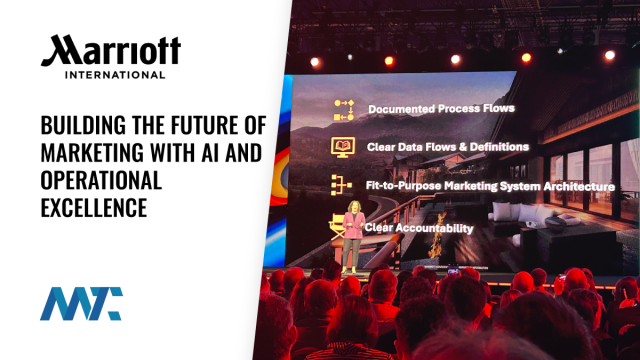In yesterday’s Adobe Summit keynotes, Hilary Cook, VP of Global Marketing Operations at Marriott International delivered a compelling keynote that challenged marketers to rethink their approach to artificial intelligence (AI), process optimization, and customer-centric marketing strategies.
Table of Contents
Looking the Future in the Face: AI and Readiness AssessmentBreaking Down the Complexity of Marketing OperationsExecutive Alignment: The Catalyst for ChangePiloting, Scaling, and Maturing AI-Driven MarketingMeasurable Impact: Speed, Scale, and Revenue GrowthOwning the Future: AI as an Enabler, Not a Shortcut
With a clear-eyed perspective on the realities of AI, Cook made one clear: AI is not a silver bullet for fixing decades of operational debt. Instead, it is a powerful amplifier—but only if the foundational work is done correctly. AI remains another shiny object that fails to scale without disciplined processes, proper documentation, and accountability.
Looking the Future in the Face: AI and Readiness Assessment
Cook opened her keynote with a provocative question: Where do we start? For many organizations, AI is a futuristic solution to modern marketing challenges. However, Cook underscored that technology alone cannot solve problems created by inefficiencies, fragmented data, and poor team alignment. She emphasized that organizations must take stock of their readiness before leveraging AI at scale.
To illustrate this, she introduced four key pillars that every marketer must master to drive effective digital transformation:
Documented Process Flows: Understanding how marketing operations function from intake to execution.
Clear Data Flows & Definitions: Ensuring the accuracy and traceability of insights that drive business decisions.
Fit-to-Purpose Marketing System Architecture: Establishing a clear use case framework before adding new tools.
Clear Accountability: Creating transparency in workflows to avoid inefficiencies and duplication.
Breaking Down the Complexity of Marketing Operations
One of the most eye-opening moments of Cook’s keynote was when she shared a deep dive into Marriott’s internal process audit. When her team mapped out how marketing initiatives moved from concept to execution, they discovered astonishing inefficiencies:
39 steps in a single workflow
45 interdependent processes across multiple teams
43 intake artifacts, of which 41 were duplicative
The takeaway? Without visibility into these inefficiencies, teams were unknowingly working against each other. Minor, localized optimizations led to disruptions elsewhere, reinforcing the need for a holistic, organization-wide approach to process transformation.
Executive Alignment: The Catalyst for Change
Fundamental transformation requires top-down buy-in, and Cook credited Marriott’s leadership across marketing, technology, digital, and data teams for fully committing to operational and technological enhancements. Once leadership alignment was secured, Marriott could centralize customer data and adopt a unified approach to marketing activation.
Cook highlighted that Marriott partnered with Adobe Real-Time CDP to create a single view of the customer, ensuring consistency in audience segmentation across Marriott’s vast global marketing ecosystem. By federating data through a structured framework, Marriott built the foundation to scale AI-powered marketing capabilities.
Piloting, Scaling, and Maturing AI-Driven Marketing
With a strong foundation, Marriott developed a Marketing and Personalization Accelerator, which connected real-world marketing needs with scalable AI-driven solutions. This initiative focused on:
Audience Strategy & Data Activation – Streamlining how data informs campaign targeting.
Content Acceleration & Syndication – Automating content distribution across touchpoints.
Orchestration & Decisioning – Enhancing personalization at scale.
Cook emphasized the importance of an incremental approach that allows for rapid piloting, scaling, and eventual full adoption. By experimenting in agile cycles and proving value early, Marriott was able to accelerate implementation and drive long-term success.
One of the most striking results of this approach was the transformation of Marriott’s Booking Journey. Traditionally consisting of only three touchpoints, the journey was expanded to 17 touchpoints across a 100-day period, significantly improving customer engagement.
Measurable Impact: Speed, Scale, and Revenue Growth
The impact of Marriott’s structured approach to AI-powered marketing was measurable and transformative:
Reduced 45 disparate processes to a single streamlined workflow.
Achieved a 93% improvement in speed for updating content and offers in market.
Increased efficiency sixfold, exceeding revenue targets by 600%.
Expanded from static campaign templates to over 500,000 personalized content variations—soon to surpass 2 million.
Reduced content production time by 70%, enabling real-time optimizations.
By structuring its AI and marketing operations around real, documented use cases, Marriott was able to unlock unprecedented efficiency and revenue potential.
Owning the Future: AI as an Enabler, Not a Shortcut
Hilary Cook closed her keynote with a call to action: AI does not dictate the future—marketers do.
She reinforced that hard work does not have to be complicated—but it does require discipline, documentation, and strategic execution. Organizations can truly unlock the power of innovation by treating AI as an enabler rather than a replacement for foundational work.
I don’t believe the future is happening to us. I believe it’s ours to build
Hilary Cook, VP of Global Marketing Operations, Marriott International
©2025 DK New Media, LLC, All rights reserved | Disclosure
Originally Published on Martech Zone: Building the Future of Marketing with AI and Operational Excellence: Hilary Cook at #AdobeSummit

